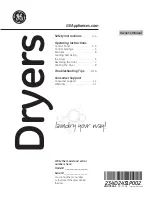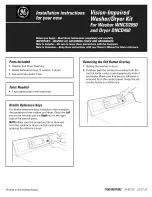
Page 12 — English
INSTALLING/REMOVING NOZZLE
See Figure 13.
WARNING:
NEVER remove nozzles without first turning off the
engine, relieving the water pressure in the trigger
handle, and locking the lock out on the trigger handle.
NEVER point the nozzle at your face or at others. The
quick-connect feature contains small springs that could
eject the nozzle with some force. Failure to follow these
instructions could result in an eye injury or other serious
personal injury.
To connect the nozzle to the trigger handle:
Turn off the pressure washer and shut off the water sup-
ply.
Pull trigger to release water pressure.
Engage the lock out on the trigger handle by pushing up
on the lock out until it clicks into the slot.
Push the nozzle into the quick-connect collar until it clicks
in place and is secured properly.
To disconnect the nozzle from the trigger handle once
the cleaning job is complete:
Turn off the pressure washer and shut off the water
supply.
Pull trigger to release water pressure.
Engage the lock out on the trigger handle by pushing up
on the lock out until it clicks into the slot.
Remove the nozzle by placing hand over nozzle then
pulling back the quick-connect collar.
USING THE 5-IN-1 CHANGE-OVER NOZZLE
See Figure 14.
There are five spray pattern settings located on the 5-in-1
Change-over Nozzle. To select a spray pattern, rotate the
spray selector to the desired setting. Refer to the
Nozzle
Selection Guide
for more information about which setting
to choose.
USING THE HIGH PRESSURE HOSE
WARNING:
Injection hazard. Fully unwrap and straighten high
pressure hose prior to and during each use and do
not allow it to become kinked. The high pressure hose
features an outer covering that provides strength to the
hose. If the outer covering becomes damaged, stop using
the hose and replace it immediately. A kinked or damaged
hose can develop a high pressure leak and result in a
possible injection or other serious personal injury.
To prevent damage to the outer covering:
Inspect the hose before every use.
Fully unwrap and straighten hose before use.
Do not allow the high pressure hose to be kinked.
Keep hose away from hot surfaces and sharp edges.
Do not pull unit by high pressure hose.
Do not allow hose to be crushed or wrapped around objects.
WASHING WITH DETERGENT
See Figures 15 - 17.
As sold, this unit is designed for use with “downstream” pres-
sure washer detergents. To convert for use with “upstream”
detergents. Contact customer service or a qualified service
center for more information.
NOTICE:
USE ONLY DETERGENTS DESIGNED FOR PRESSURE
WASHERS.
Do not use household detergents, acids,
alkalines, bleaches, solvents, flammable material, or
industrial grade solutions, which can damage the pump
or cause property damage. Many detergents may
require mixing prior to use. Prepare cleaning solution
as instructed on the solution bottle. Always test in an
inconspicuous area before beginning.
Remove the cap from the soap tank and pour pressure
washer detergent in the tank. Replace cap on tank.
NOTE:
The machine setting of this unit is 20:1, which usu-
ally allows the use of 1 gallon pressure washer detergent
without further dilution. Check your detergent instructions
to be sure additional dilution is not necessary.
Install 5-in-1 Change-over Nozzle (if necessary). Rotate
the spray selector on the nozzle to either the blue short
range detergent ( ) or blue long range detergent ( )
setting.
Squeeze the trigger and wait approximately 5 seconds
for the detergent to appear.
Spray the detergent on a dry surface using long, even,
overlapping strokes. To prevent streaking, do not allow
detergent to dry on the surface.
For long range detergent application:
With the nozzle installed on the spray wand and the engine
shut off, rotate the spray selector to the long range detergent
[ ] setting.
For short range detergent application:
With the nozzle installed on the spray wand and the engine
shut off, rotate the spray selector to the short range detergent
[ ] setting.
Before shutting off the engine:
Fill the soap tank with clean water.
Spray the clear water through the spray wand until the
tank is empty.
If any soap remains in the spray, repeat with a second
tank of clean water.
Shut off the engine.
OPERATION
















































